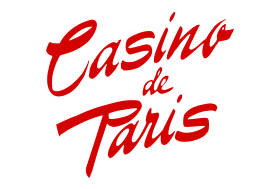Casino de Paris (film)
| Movie | |
|---|---|
| Original title | Casino de Paris |
| Country of production | France , Italy , Germany |
| original language | German |
| Publishing year | 1957 |
| length | 95 minutes |
| Age rating | FSK 12 |
| Rod | |
| Director | André Hunebelle |
| script |
Jean Halein Hans Wilhelm |
| production |
Dietrich von Theobald for Bavaria Filmkunst |
| music |
Gilbert Bécaud Paul Durand Heinz Gietz Heinz Kiessling |
| camera |
Henri Alekan Bruno Mondi |
| cut | Lilian Seng |
| occupation | |
| |
Casino de Paris is a French-German-Italian revue film by André Hunebelle from 1957.
action
Catherine Miller is the star at the Paris Casino de Paris. Here, the successful writer Alexander Gordy listens to her and offers her to play the leading role in his new play. Catherine accepts enthusiastically and, at her mother's insistence, travels to Cannes without quitting at the casino , where Gordy has arranged rehearsals. She takes her parents with her.
In Cannes meanwhile, Gordy's secretary Jacques Marval is disgruntled, he is the ghostwriter for all of Gordy's successful plays, but is always in the shadow of the supposed star author, who also has an easy time with women due to his fame. Jacques falls in love with Catherine but believes Gordy seduced her and therefore treats her condescendingly. Catherine's father would love the down-to-earth Jacques as a son-in-law, while the mother prefers the rich Gordy as a son-in-law. He in turn has the newspapers write of an imminent wedding with Catherine, but denies this to Catherine, who feels taken by surprise.
In the end, Catherine's father, Jacques and the boss of the Casino de Paris Mario join forces: Jacques writes a play about a rich author who secretly lets his secretary write his plays, and a woman who stands between the two men. Catherine is supposed to play the main role, but does not yet know this. She found out about it through a third party on the phone and suspected an intrigue, especially since she would lose her engagement with Gordy. First Gordy explains to her that Jacques actually wrote all the pieces that made him famous and was too modest to admit it publicly in front of her. She starts looking for him.
A little later, Catherine and Jacques are on stage at the Casino de Paris and play in Jacques' musical theater piece, which is a great success.
production
Casino de Paris was filmed from February 15 to March 1957. The film had its German-language premiere on September 26, 1957 in the Apollo in Düsseldorf .
The film features various titles sung by Gilbert Bécaud: La machine à écrire , Square Sevrine , Le Médecin , Incroyablement and Filles et garçons . All French songs except La machine à écrire were presented in the German sound version with German texts. Caterina Valente, who also sings numerous songs in the film, had previously performed with Bécaud in Parisian clubs and used her popularity to promote Bécaud's career in Germany.
criticism
In 1957, the film service called Casino de Paris a "dozen story" and determined that director Hunebelle "did not produce a surprising, but nevertheless an acceptable entertainment film with a cheerful look, using rich revue and equipment effects."
The Lexicon of International Films wrote in 1990 that "the musically dull revue film [...] does not [keep] what the addition of international stars promises."
Cinema summarized the film as "Kitsch à la Valente: colorful and yet bland".
Web links
- Casino de Paris in the Internet Movie Database (English)
- Casino de Paris at filmportal.de
Individual evidence
- ↑ a b cf. cinema.de , accessed on August 1, 2018.
- ^ CK: Casino de Paris . In: Film-Dienst , No. 44, 1957.
- ↑ Klaus Brühne (Ed.): Lexicon of International Films . Volume 1. Rowohlt, Reinbek bei Hamburg 1990, p. 511.
